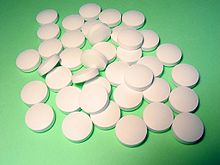In a report entitiled ‘UK professor says supplements are a waste of time’ Professor Brian Ratcliffe said that: “The likes of vitamin A and vitamin C are a waste of money for most people and can even be detrimental to health. Many food supplements were ineffective for the majority of people and overuse of vitamin C for example, could lead to stomach problems.”
In response, The National Association of Health Stores issued a statement backing supplement use, as a way of compensating for nutrient-poor diets:
Evidence amassed by the Food Standards Agency tells us that the concept of the healthy, balanced diet still eludes the overwhelming majority of the British public. And, of course, if you are ill, smoke, drink alcohol or exposed to environmental toxins such as traffic fumes your body benefits from a higher intake of vitamins and minerals and of course, if you are eating less than a certain number of calories such as when you are dieting, it is more difficult to get the nutrients you need from food.
So, in an effort to sort the ‘wheat from the chaff’, totalhealth author and Clinical Scientist, Mr John Christofides provides us with an expert and sensible overview of whether vitamins and supplements really work:
We derive our ‘5-a-day’ fruit and vegetable advice from the World Cancer Research Fund Report 2007 which indicates that 80% of cancers can be reduced by 6-20% per serving. The Panel's judgements table makes interesting reading for positive benefits: carotenoids "convincingly" decrease risk of mouth and lung cancers, vitamin C and beta-carotene "convincingly" decrease the risk of oesophageal cancer, lycopene "convincingly" decreases the risk of prostate cancer and also that vitamin E has a "limited suggestive decreased risk" of oesophageal and prostate cancer.
He goes onto explain the studies that most of the recent observations have come from the French SUVIDEX study which does not claim positive or negative effects for multivitamin supplementation and has shown that there is no extra protection against cancer and coronary heart disease (CHD) from low dose vitamin supplements.
Mr Christofides states that at the other end of the spectrum "...megadose vitamin C as prescribed by Linus Pauling can cause gut problems, possibly kidney stones and may actually damage teeth if chewed but probably wont kill you. However, completing the circle now with some new negative findings is a meta analysis showing that vitamin E in large doses ie. >150ug/day actually increases mortality and that extra beta-carotene supplements may actually contribute to the cause of lung cancer.”
So what is the best that we can glean from all these latest comments? John Christofides says:
With so much accessible information, nutritional scientists are not doing terribly well at advising the general public so I welcome Professor Ratcliffe's statement with one exception: vitamin supplements out of a bottle are probably unnecessary unless a patient has been biochemically tested and shown to be vitamin deficient although it is increasingly evident that the exception is vitamin D. The closest thing to a ‘good diet’ is probably something close to the Mediterranean diet ie plenty of fresh fruit and vegetables, less red meat and more oily fish washed down with diluted red wine or grapejuice for the teetotaller.



